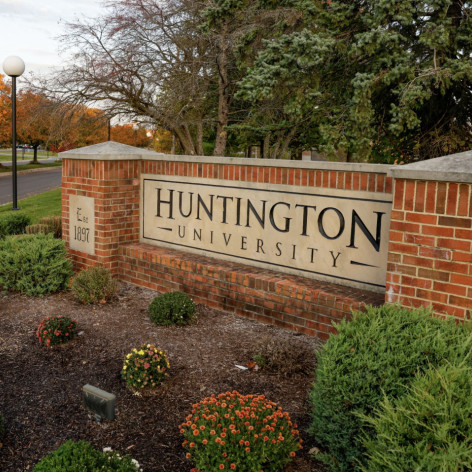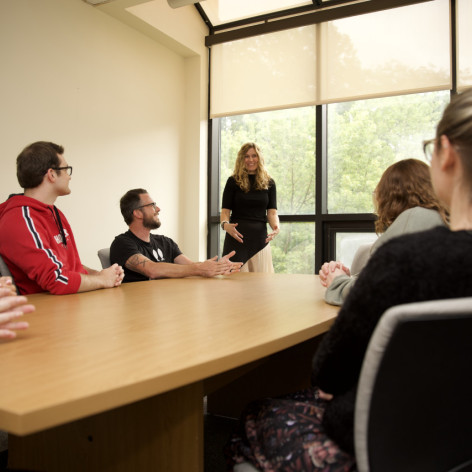College prof helps sixth-graders learn from mistakes
FOR RELEASE: Tuesday, November 23, 1999
Huntington, Ind. " Dr. Patrick Eggleton, assistant professor of mathematics at Huntington College, visited the sixth grade class of Mr. Greg Fiedler at Crestview Middle School today, offering students ideas about how they can learn from their mistakes. I had the students work through some of the activities mentioned in an article I've co-authored for a professional journal, explained Eggleton. In the first activity the students were given a card with a fraction, decimal, or percentage shown on it. The students were then asked to line up in order based on the numbers on their cards. The students did an excellent job. As they discussed issues such as whether 0.3% was greater or smaller than 30/100, the students developed even stronger understandings of these fractional representations. Many mistakes were made and students were eventually able to find their own mistakes and come to solid conclusions as to where they belonged in the line-up.
The second activity was much more difficult. The students were given the total price of a car after sales tax. They were asked to find the price of the car before the tax. While none of the students were able to find the actual price of the car by the time we left, they were able to create solutions that seemed computationally logical yet were wrong answers. The important part was that they were able to tell me that their answer was wrong, give me a good reason as to why they knew they were wrong, and then develop a new strategy to try to find the right answer. I was very impressed by their problem solving abilities and their disposition to continue.
Eggleton believes building from mistakes is crucial in learning mathematics. Too often, traditional mathematics classrooms focus on a rote process to learn mathematical computations, but ignore the importance of developing sound problem solving abilities, he says. In an article co-authored with Carla C. Moldavan of Berry College (GA), Eggleton argues that educators should help students develop their reasoning skills while emphasizing the importance of accuracy in computation. This is best accomplished when students learn in an environment where mistakes are allowed, but are challenged by the students and the teacher, says Eggleton. As students learn to argue for their answers and find flaws in their own arguments, they eventually become more proficient in looking for errors and making stronger arguments for correct answers. This is the type of mathematical skill that is essential in application in most real-world settings.
Mistakes are like little lessons all in themselves. If you face them as learning opportunities rather than reminders of your inabilities, then you're bound to be a better mathematician.
To illustrate his point, Eggleton relates a story told by a father of two sons. One son was exposed to a very traditional approach, whereas the other child saw mathematics through the process of explorations and discovery. The first son's reaction to a difficult problem was I don't get it,' while the other son's reaction would more likely be I don't get it YET!'
When we teach children that mistakes can be the beginning of the learning process, that they are stepping stones leading to success, we are much more likely to see a child who says, I don't get it YET!'' says Eggleton. Mistakes are like little lessons all in themselves. If you face them as learning opportunities rather than reminders of your inabilities, then you're bound to be a better mathematician.
Eggleton's visit to Crestview Middle School was photographed by Huntington College student Kristin Stangland. With parents' permission, some photos of the children may be published later this year with Eggleton and Moldavan's article in Mathematics Teaching in the Middle School, a professional journal published by the National Council of Teachers of Mathematics (www.nctm.org ). With about 110,000 members, NCTM is the largest nonprofit professional association of mathematics educators in the world.
Eggleton is the newest member of the mathematics faculty at Huntington College. Eggleton completed his BS and MEd degrees at the University of South Florida and his PhD in mathematics education at the University of Georgia. Eggleton taught four years at Berry College in Georgia. He also has five years of public high school teaching experience. Eggleton is an active researcher and writer and has also made numerous professional presentations. His article, "Experiencing Radians," was the cover story of the September 1999 issue of Mathematics Teacher magazine.
Mathematics education is among many outstanding academic programs at Huntington College. Founded in 1897, the Christian liberal arts college offers graduate and undergraduate degrees in nearly 50 academic concentrations. Huntington College is located on a contemporary, lakeside campus in Huntington, Indiana.



